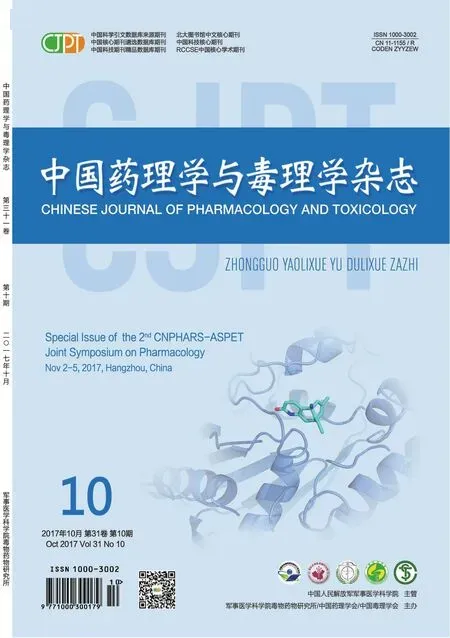Connexin 40-formed GJIC increases the phototoxicity of photodynamic therapy through ROS-and calcium-mediated pathways
Deng-pan WU,Li-ru BAI,Jin-lan HUANG
(Pharmacy School of Xuzhou Medical University,1.Jiangsu Key Laboratory of New Drug Research and Clinical Pharmacy,2.Department of Pharmacology,Xuzhou 221004,China)
T3-18
Connexin 40-formed GJIC increases the phototoxicity of photodynamic therapy through ROS-and calcium-mediated pathways
Deng-pan WU1,2,Li-ru BAI1,2,Jin-lan HUANG1,2
(Pharmacy School of Xuzhou Medical University,1.Jiangsu Key Laboratory of New Drug Research and Clinical Pharmacy,2.Department of Pharmacology,Xuzhou 221004,China)
OBJECTIVETo explore the effect of connexin(Cx)40-formed gap junctional intercellular communication(GJIC)on Photofrin-photodynamic therapy(PDT)phototoxicity in Cx40-transfected HeLa cells and its potential mechanisms.METHODSHeLa cell line stably transfected to express Cx40 was seeded at high and low cell density,respectively,to assess in vitro photosensitivity using CCK8 assay.Western blot assay was performed to detect the expression of Cx40.The intracellular ROS and Ca2+concentrations were determined using flow cytometer.4-HNE and ceramide were measured using ELISA assay.RESULTSCx40-composed GJ formation at high density enhances the phototoxicity of Photofrin-PDT.When the Cx40 is not expressed or Cx40 channels are blocked,the phototoxicity in high-density cultures substantially reduces,indicating that the enhanced PDT phototoxicity at high density is mediated by Cx40-composed GJIC.The GJIC-mediated increase in PDT phototoxicity was associated with ROS and calcium-mediated stress signaling pathways.CONCLUSIONThe work uniquely presents the ability of Cx40-composed GJIC to enhance the sensitivity of malignant cells to PDT,and indicates that mainte⁃nance or increase of Cx40-formed GJIC may be a profitable strategy towards the enhancement of PDT therapeutic efficiency.
photodynamic therapy;gap junctional intercellular communication;connexin40;phototoxicity
The project supported by National Natural Science Foundation of China(81402946);Initializing Fund of Xuzhou Medical University of China(D2014017 and D2014010);and Natural Science Research Grant of Higher Education of Jiangsu Province of China(14KJD310002)
Deng-pan WU,Tel:18761438273;E-mail:dengpanwu@xzhmu.edu.cn
- 中国药理学与毒理学杂志的其它文章
- Identification and optimization of a potent and highly selective D3 dopamine receptor agonist
- Protective role of FoxO transcription factors against oxidative stress-induced chondrocyte dysfunction:a new therapeutic target for osteoarthritis
- Meta-analysis of serum copper and heart failure
- Involvement of cysteinyl leukotriene signaling in microglial morphological changes and CASP1 expression in vitro
- Inhibitory effect of compound NS5806 on cardiac transient outward potassium channel dependents on interaction between auxiliary subunits
- Specific role of synovial macrophages in rheumatoid arthritis

